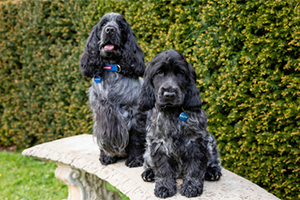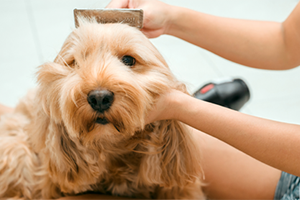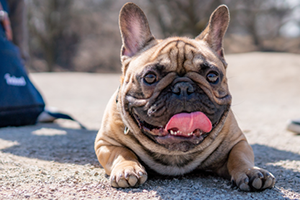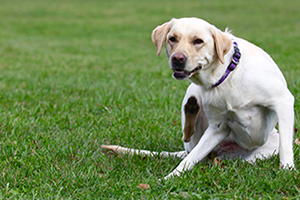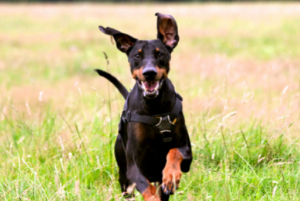
An affectionate and playful companion that loves being around people.
Vital stats
Swipe to view more
| Size: | Small to medium |
| Coat: | Long & silky requiring daily brushing |
| Exercise | Up to 30 minutes a day |
| Life span: | 10+ years |
| Breed group: | Toy/ Utility |
| Temperament: | Affectionate, playful, extroverted |
Shih Tzu temperament & personality

- Shih Tzus relish human company and are happiest when they’re at your feet or side so are best suited for owners who can be home most of the time.
- This breed tends to be wary of strangers and prefer getting to know people on their own terms meaning they need lots of socialisation as puppies.
- Usually comfortable with other dogs and pets, as long as introductions are careful.
- Keep an eye on playtime with small children – Shih Tzus don’t tolerate rough play and can be quick to make their feelings known.
Shih Tzu training & exercise

Training tips
- Shih Tzu puppies are so small and fluffy that their cuteness often tricks owners into thinking they can delay training. In truth, this breed can have a stubborn streak so it’s best to start training from 8 weeks old.
- Keep training sessions short – around five to ten minutes – to stop your pup getting bored.
Keeping them happy
- They may be small, but Shih Tzu puppies can be hyper! A combination of short walks and games will help expel excess energy and avoid unwanted behaviours.
- Shih Tzus love treats but there’s one thing they love more — their humans! Proper socialisation will help to avoid any possessiveness the breed is known for.
- Shih Tzus can be prone to separation anxiety, so should only be left alone for short periods of time.
Exercise
- An adult Shih Tzu needs between 30 minutes and one hour of exercise per day, ideally split into two walks with playtime in between.
- As a brachycephalic (flat-faced) breed, your Shih Tzu’s exercise regime should include plenty of chances to rest and cool down, especially in summer.
Game ideas
- Hide and seek is the perfect game to play with your Shih Tzu because finding you is the reward!
- A ‘lucky dip’ is another great way to keep your Shih Tzu entertained. Fill a large box with mundane filler items, like old toilet roll tubes or newspaper, and hide his or her toys at the bottom. Your dog will love rifling through the box to find buried treasure.
Common Shih Tzu health conditions
.png)
Shih Tzu grooming

Shih Tzus’ enviable, luxurious coats require some extra grooming, but they shed less often than their long locks might suggest.
- Shih Tzus typically have long, dense outer coat that can be straight or wavy, and a soft, woolly undercoat. Their most distinctive Shih Tzu traits include their full, cascading tail and a fringe that grows over their eyes, leading to the top knot style favoured by many owners.
- The breed can require extra grooming time and some owners do choose to visit professional groomers and have their Shih Tzu’s hair cut short.
- Shih Tzus don’t shed seasonally and can be a good option for some allergy sufferers – but it’s important to remember that no dog can be totally hypoallergenic.
- The breed has slight underbite which can mean that their teeth become overcrowded and more prone to issues such as abscesses and gum disease. Regular tooth brushing can help keep any problems at bay.
Shih Tzu nutrition

Because this breed can be prone to heart disorders and spinal problems (conditions that can be made worse by obesity) it’s especially important to give your Shih Tzu a healthy diet.
- Feed them a breed appropriate food twice a day, sticking to the portion size guidelines and making sure to consider their age, lifestyle and activity level.
- Shih Tzus can be fussy eaters. A combination of dry kibble and a moist food will give them some variety and help keep your Shih Tzu healthy.
What to know before you buy or rehome a Shih Tzu

Considering welcoming a ‘little lion’ into your home? Before you buy or adopt a Shih Tzu, here are a few important things to remember.
- Bred to be companions, Shih Tzus make family pets who love spending time with their humans, and tend to get on well with children and other animals.
- Training a Shih Tzu can be challenging due to their independent streak, so be realistic about how much time you have for training.
- Choose a licensed and reputable Shih Tzu breeder if you’re buying a puppy. ‘Lucy’s Law’ dictates that new puppies or kittens must be bought directly from a breeder or adopted from rescue. Third party sellers are illegal.
- Like all dogs, Shih Tzus can suffer from a range of health conditions so always look carefully at the veterinary cover provided when shopping around for pet insurance as not all policies are the same.
Shih Tzu frequently asked questions
Discover some of the most popular dog breeds
Shih Tzu insurance considerations
We always offer these things as standard:
Physiotherapy & pet therapies
Along with physiotherapy, which is covered within the Vet Bills benefit, we also cover Pet Therapies like herbal medicine, homeopathy and acupuncture. You can also claim for hydrotherapy, up to £500 per illness/injury in dogs and cats (no additional limit for rabbits).
Petplan is a trading name of Pet Plan Limited (Registered in England No. 1282939) and Allianz Insurance plc (Registered in England No. 84638), Registered office: 57 Ladymead, Guildford, Surrey GU1 1DB.
Pet Plan Limited is authorised and regulated by the Financial Conduct Authority. Financial Services Register No. 311969. Allianz Insurance plc is authorised by the Prudential Regulation Authority and regulated by the Financial Conduct Authority and the Prudential Regulation Authority. Financial Services Register No. 121849. Pet Plan Limited is a subsidiary of Allianz Insurance plc.







































